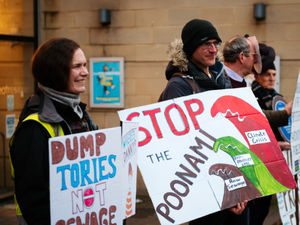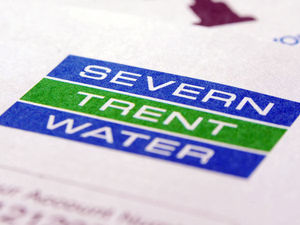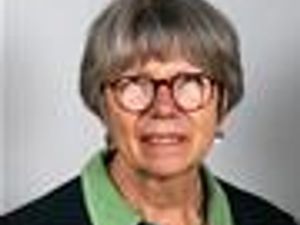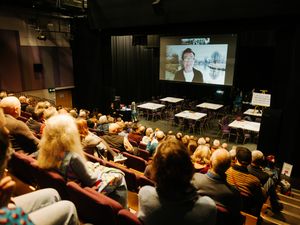Hundreds gather to vent fury over raw sewage being pumped into River Severn
Hundreds gathered to vent fury and call for change over the dumping of raw sewage in the River Severn.

A meeting was held at Theatre Severn in Shrewsbury to raise awareness and consider what action can be taken to combat the issue.
Ahead of the meeting, Up Sewage Creek campaigners in poo hats held up placards and banners warning of a "poonami" and accused Severn Trent of profiting from pollution.
At the meeting, Up Sewage Creek's Claire Kirby said that in a rich nation "we shouldn't have to walk through **** on our way into town," and a town fisheries boss told how a little boy caught a sanitary pad when he went on his first ever fishing trip with his dad by Kingsland Bridge.
Prominent national campaigner Ash Smith also gave a presentation, as well as a local boss from Severn Trent.
MPs accused councillors of making "wild accusations" and misinforming the electorate over raw sewage being dumped in the River Severn.
Shrewsbury MP Daniel Kawczynski and Ludlow MP Philip Dunne made brief but controversial appearances at the meeting.
Mr Kawczynski said: "If you go round the Quarry there have been signs put up saying that I have voted to allow companies to pump sewage into our rivers.
"There have even been posters put up in the constituency saying that, I think it's highly irresponsible and misleading. There is already enough misinformation and antagonism."
Shrewsbury mayor Elisabeth Roberts asked Mr Kawczynski to clarify which statements he found objectionable, but he said: "I'm not going to start going down that route, thank you very much," before leaving the meeting.
Mr Dunne said: "There has been some very inappropriate politicisation of this issue which is alleging that politicians don't care. That we're voting for pouring sewage into the river.
"This is pure political posturing. It is not true and it is not helpful of some parties to try and make political capital."
All 250 tickets for the meeting were snapped up quickly. Raw sewage dumping in Shropshire even caught the attention of 80s pop legend and river campaigner Feargal Sharkey. After seeing a Shropshire Star article where campaigners threatened to withhold their water bills if the River Severn is not improved, Mr Sharkey said on social media that pollution will be a "massive issue" at the next election.
Raw sewage discharge into the River Severn has been a particularly contentious issue since late 2021, when Conservative MPs voted against a proposal from the Lords to the Environment Bill that would have placed legal duties on water companies to reduce discharges.
The vote sparked uproar, with Tories being accused of giving the go-ahead to companies to dump raw sewage in rivers.
The MPs defended themselves, insisting safeguards already exist and new measures would cost billions.
In Shrewsbury, Up Sewage Creek marched with 100 people through the streets, saying they'd had enough of seeing the river ruined by human excrement and sanitary waste. They also said there was frustration that the town's MP Mr Kawczynski had not done more to protect the River Severn in Commons debates.
Several protests have been undertaken by the group, including one at a town council meeting where a Severn Trent boss was in attendance. Campaigners wore fish heads and poo hats, banging drums and chanting outside Shirehall.
Recently, a Shrewsbury Town Council fisheries report said that the River Severn was so bad in some areas that anglers are catching more tampons than fish.
Severn Trent has said it is "absolutely committed to improving the health of our regions rivers", and that it is spending £100 million a year on the cause. The firm also points to Environment Agency statistics which say the company is responsible for 24 per cent of the reasons for the Severn not achieving "good" status. A spokesman said: "Last year we pledged that our operations will not be the reason for unhealthy rivers by 2030.
“In the last year we have made progress and already reduced Severn Trent’s contribution to rivers in our region not achieving good environmental status to 18%, putting us ahead of our plan to reach 0% by 2030.”





